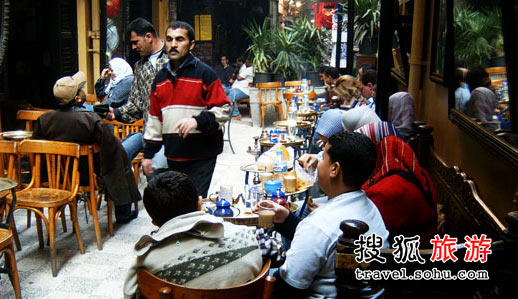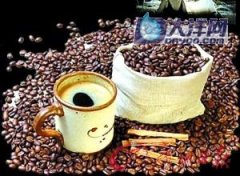"Mother of the City" Cairo: authentic life begins with coffee
Summary: Cairo, the capital of Egypt, across the Nile, majestic and spectacular, is the political, economic and commercial center of the entire Middle East. Taste, a strong smell of coffee mixed with some spices can not help but sigh, here is the taste of Cairo.

A western-style cafe for foreign use
Summary:
Authentic life in Cairo's favorite cafe.
If Cairo is described as the "capital of thousands of pagodas" for its many mosques, then there is one thing in Cairo that exceeds the number of mosques: Egyptian cafes. Coffee is not a native product of Egypt, but was introduced into the daily life of Egyptians in the mid-15th century. At first, Egyptians equated coffee beans with marijuana, while the Koran stipulated that all narcotics should be banned. As a result, cafes are associated with drug abuse, prostitution and idleness. Now, men in Cairo go to cafes almost every day. It's not that they know much about coffee, some of them can't even tell who is good or who is bad between mocha and espresso. To the Egyptians, coffee is coffee, a small cup of liquid the size of a Guangdong Chaozhou time teacup, mixed with half a cup of coffee powder and half a cup of water, and then added a lot of sugar. You can dry it in a couple of mouthfuls, and then use a large glass of boiled water to refresh. No one will become a regular customer there because of the good coffee brewing in that cafe. The cafe is more of an Egyptian attitude towards life.
Someone once said, "the Fesavi Cafe is more representative of Cairo than the pyramids." At first glance, this sentence sounds like an exaggeration, but after going to Fesavi Cafe, you will feel that it is absolutely right. The Fesavi Cafe is the oldest and most famous cafe in Cairo. After several twists and turns along the winding path, thanks to the guidance of warm-hearted people, we found the Fesavi Cafe hidden in the depths of the famous Hariri market in the old city of Cairo. Surrounded by small shops on both sides, this famous store with a long history of 238 years seems so modest and low-key. In the semi-open shop, there are more than ten sets of tables and chairs in two rows in the open air, all of which are small round tables with yellow copper faces and three or four small rattan chairs. An open dark brown hollowed-out wooden door had faded, with mottled rust on the hinges.
The shop assistant who greeted us is Ali, a man in his 30s who has been working here for 10 years. The cafe is open 24 hours a day, with a steady flow of people, not only Egyptians, but also many tourists. As soon as he saw that we were foreigners, Ali excitedly pulled us to the innermost corner, where a picture of a thin but Hale and hearty elder hung on the wall. He pointed proudly to a chair and said, "this is where Mahfud M.D. used to sit."
Mahfud M.D. (1911-2006) is a great literary master loved by Egyptians. He was born and raised in Cairo. He lives in the old neighborhood near the coffee shop. His daily hobby is to shop in coffee shops, and Fesavi is his frequent patronage. It was in such a cafe that Mahfud M.D. observed the city life in Egypt, told the stories of ordinary people, and wrote the novel trilogy "Palace Street", "Si Gong Street" and "nectar Street". In the form of autobiography, he described the rise and fall of a Cairo family from the 1920s to the 1950s, and won the Nobel Prize for Literature in 1988. He became the first and only Arab writer to win this honor and enjoyed a high reputation in Egypt and the Arab world as a whole.
We sat down where Mahfud M.D. used to sit. The waiter said the store only sells traditional Egyptian drinks, black tea, Egyptian coffee, fresh fruit juices and hookahs. As soon as I asked the price, I found that this prestigious cafe had an incredible civilian price. A cup of Egyptian coffee with the most local characteristics is only equivalent to six or seven yuan.
Looking around, there are all kinds of people sitting in the shop, including local women in headscarves, Arab men in suits and blue-eyed western tourists. Some are chatting, some are taking a nap, others are doing nothing but sitting in a daze. Waiters in light blue uniforms fly up and down the narrow aisle with trays, and some vendors come forward from time to time to peddle souvenirs in less fluent English. Under the tables and chairs, the slender Egyptian cat "strolls around" as if it were its owner.
Emmani, a 25-year-old Arab girl, is a local English teacher. She said that she was a regular customer here, and her parents used to bring her here when she was a child. Although the drink was the same as anywhere else, the atmosphere was different. Every time I come here, I feel very kind.
Soon, the waiter brought us a drink, and the small white porcelain cup was filled with strong-colored coffee. Taste, a strong smell of coffee mixed with some spices can not help but sigh, here is the taste of Cairo.
China Coffee Trading Network: www.gafei.com
Important Notice :
前街咖啡 FrontStreet Coffee has moved to new addredd:
FrontStreet Coffee Address: 315,Donghua East Road,GuangZhou
Tel:020 38364473
- Prev

Ethiopian coffee
Ethiopia in East Africa means the land inhabited by people tanned by the sun in ancient Greek. Ethiopia's unique cultural tradition, spectacular scenery, pleasant climate, rich animal and plant resources, important places of interest, hospitality and friendly people make it one of the major tourist destinations in Africa. The name Coffee comes from kaffa in Ethiopia, you know.
- Next

Beauty in the Blue Mountain Coffee of Jamaica
Blue Mountain Coffee is cool and foggy over 1800 meters. Blue Mountain Coffee has been praised as the best coffee because of its sparse production and bitter taste. Its sweet, bitter and mellow taste has always been respected by consumers. The official website of the Jamaican government Blue Mountain Coffee gives a very strict definition: blue Mountain Coffee must be grown in the Blue Mountain area and processed by a government-authorized processing plant.
Related
- How did the Salvadoran coffee industry develop in Central America?
- What exactly does the golden cup extraction of coffee mean?
- The Origin of Coffee flower
- [2023 Starbucks World Earth Day] there are more meaningful things besides free Starbucks coffee!
- What kind of coffee is there in Spain? 9 Flavors of Spanish Coffee
- Aromatic African coffee| Kenya's coffee culture and historical production area
- Liberica Coffee Bean knowledge: the characteristics of Liberian Coffee beans of the three original species of Coffee beans
- The origin and formula of Spanish latte introduces the taste characteristics of Bombon coffee in Valencia, Spain.
- How to adjust the solution of over-extracted coffee
- What is the tasting period of coffee beans? What is the period of coffee and beans? How should coffee wake up and raise beans?

